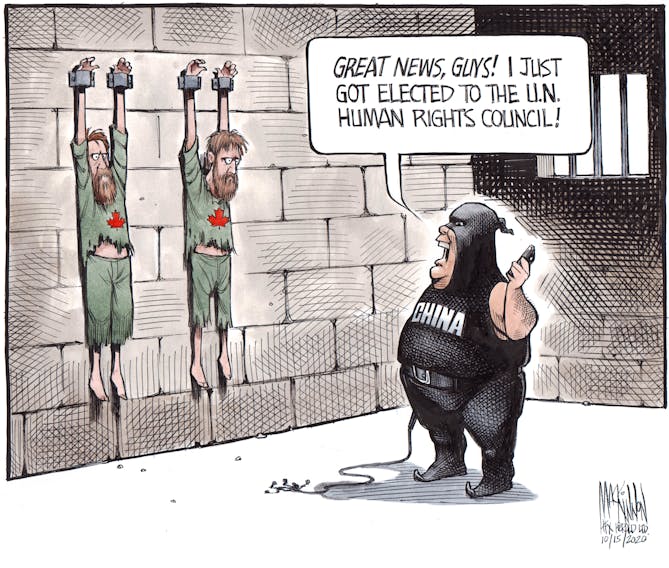In recent weeks, there has been renewed attention on Canada’s relationship with China. It is not a pretty picture.
Public opinion polls now register sharply growing negative views toward China among Canadians. After a long and fractious disagreement over the arrest — at Uncle Sam’s behest — of Meng Wanzhou, a member of the Chinese corporate elite closely connected to senior members of the Chinese Communist Party, China upped the ante by kidnapping two mid-level Canadian officials and holding them in medieval prison conditions under 24-hour lights for months on end while preventing consular access to them by Canada.
Since then, Canada’s relationship with China has rapidly gone downhill, and it reached a new low last week with China appearing to threaten the more than 300,000 Canadian passport holders residing in Hong Kong.
Reaction on the street here and in diplomatic circles has been swift. From one end of the spectrum have come warnings about riling up the Chinese Dragon. On the other end of the spectrum have come calls for boycotting Chinese goods (good luck!); embargoing Huawei 5G infrastructure (long overdue); and expelling the Chinese ambassador to Canada (to what effect?).
What a mess!
And it all might have been avoided with a little legerdemain, as told me by one former Canadian cabinet minister: “Mr. Chrétien would simply have let Ms. Meng go and would have told the Americans, ‘Oops, we missed her flight!’ Or, ‘Gosh darn, we seemed to have lost her file. Very sorry.’”
Yet if Canada’s actions in the Meng affair have been hamfisted and naive, China's detention of innocent Canadians is completely unacceptable.
There is no doubt who holds the power cards in this game, as Canadian Ambassador to the UN, Bob Rae, pointed out in his stinging and candid rebuke of the Chinese from the UN General Assembly rostrum: “When a superpower country of more than a billion population accuses a country like Canada with 35 million people of bullying them ... and treats our citizens in prison like that …”
You can finish his sentence.
Or maybe not. Because immediately following that grammatically odd but forceful phrasing, in what must go down as one of the angriest denunciations in the history of Canadian diplomacy, Rae then added, in tones reminiscent of Adlai Stevenson’s famous “till hell freezes over” UN speech, these words: “We will never forget that.”
Now here’s the catch. The Chinese just may have the monopoly on “we’ll never forget that” — along with their monopoly over most of the world's manufactured goods and our COVID-19 PPE supplies.
Personally, I applaud Mr. Rae’s strong condemnation of the kidnapping and the quasi-torture of the two Michaels. But the threat implicit in the phrase “we will never forget that” may have marked a poor choice of words.
Probably no country has been more badly treated over the last 300 years by the power of rising Western nations than China. In the 19th century, under a pretext of their right to free trade, Britain, France and the United States ruthlessly forced opium imported from the British East India Company and from Turkey upon the Chinese population, despite strenuous objections from a weakened Chinese central government. When negotiation failed to gain them access to Chinese markets, they resorted to force in the aptly named Opium Wars. From the Western imposition of British East India Company opium that was used to bludgeon our way into the 19th-century Chinese market, to our very own homegrown Chinese Immigration Act of 1885 (modelled after the American Chinese Exclusion Act of 1882), China has been brutally abused by the rich West for a very long time. And they have not forgotten that!
(For a brief and incisive take, see Karl E. Meyer’s The Opium War’s Secret History published in the New York Times on June 28, 1997 and available free online.
Those days are over.
Measured any way Nobel laureates recommend, China has the world’s largest, most powerful, and still fastest-growing economy. Its military is now so large and so well-equipped as to be almost unbeatable. And an alliance with a newly assertive Russia — with its vast resources and endless landmass — would create a titanic global power duo that no combination of alliances anywhere could hope to defeat. Small wonder New York Times columnist Tom Friedman ended his Oct. 13 column with: “Russia and China, please do not invade us right now.”
And speaking of not forgetting, there is a chilling, if historical irony, in the fact that most of the opioids now killing hundreds of Canadians and Americans come to our shores from China. A mere coincidence? Maybe not.
Yet despite our very vulnerable position vis à vis China, we must defend our principles. But more than that, we must start living them. Enough with the birthday party chants of “rule of law”! Face up to the findings of the federal and provincial law reform commissions: too often, we let the rich off and imprison the poor!
Recall the situation the U.S. found itself in during its war against Nazi Germany. Racist “Amerika” was forced to reconsider its treatment of American Blacks as it burned down the remains of Hitler’s death camps established to exterminate Europe’s Jews and other minorities. Canada cannot preserve the moral high ground if we fail to live up to our own democratic and societal values. So how’s that commitment to provide safe drinking water on First Nations reservations going there, Ottawa?
But back to the main subject at hand: how did we arrive at this dreadful imbroglio with China, and what is to be done?
Thus far, neither Canadian nor American politicians have had the courage to face the root of the problem squarely: we have sacrificed our democratic values, our jobs, and we have compromised our children’s futures to Canadian and American multinational corporations who can quarter their costs and triple their profits by manufacturing almost everything in China. And Walmart is effectively “The China Store.”
Meanwhile, these same corporations have acquired undue influence in our legislatures, in our politics, and in our administrative tribunals. And often, they do not even pay their taxes! For example, Canada's lucrative oil industry — even in the halcyon days of $100-a-barrel oil — owed hundreds of millions of dollars in unpaid taxes. This, despite generous writeoffs given to it by a lopsided tax code, which often appears to have been conceived to protect the wealthy who can afford both expensive lobbyists and even more expensive tax lawyers. Yet the Canadian Revenue Agency will pursue the average working Canadian family for $50, while letting the likes of the Bronfmans move billions of dollars in taxable resources to offshore tax hideouts.
Is this the rule of law we boast about so often?
Democratic governments must reassert their control over the corporate sector. Ignore the flippant, immoral and often tongue-in-cheek claims that shareholder profits must come before the national interest! Really?
Remove the shameful bias against the poor and against persons of colour in our justice systems, from coast to coast to coast, as Nova Scotia Premier Stephen McNeil has called for. Reassert control over wayward corporate interests that are too quick to outsource jobs to low-wage countries with weak environmental laws and no civil rights protections.
Then perhaps we can begin to manufacture some of the basic goods and services we need here at home, without going hat in hand to China begging for N-95 masks, PPE gowns, or COVID-testing reagents.
Before we preach to the rest of the world about who will “never forget,” we’d better make darn sure our own house is in order.
Brian Richard Joseph of North Sydney studied at St. Francis Xavier, the University of Toronto and Harvard, where he won Harvard’s highest academic award. He served as special adviser in the Privy Council under Pierre Trudeau, and more recently completed two terms as commissioner at the Law Reform Commission of Nova Scotia.









